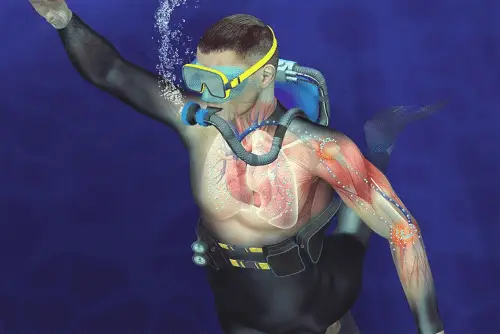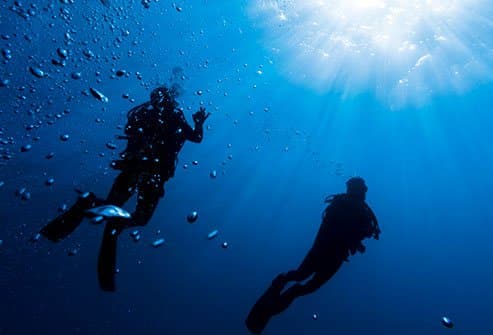2Though scuba diving or any underwater aquatic sport appears to be simple and fun on the surface, there are actually a lot of issues that you can encounter when exploring the ocean. For one, you could have to deal with issues such as nitrogen narcosis or cramp, which are both incredibly uncomfortable. But the most annoying and most common issue that you may have to face is actually decompression sickness or the bends. But what is decompression sickness and why do people refer to it as the bends?
What is decompression sickness?
Decompression sickness is a very common ailment that scuba divers experience. It occurs when underwater because the air that scuba divers use in a tank is far more compressed than air that is taken in on the surface, because of this when you inhale air from an oxygen tank, you are also taking in far more molecules. Because of this, you inhale nitrogen molecules that are usually quickly expelled from the body instead start to bubble in your blood and tissue.
You start to experience issues when these bubbles begin to expand, which can be triggered by excessive inhalation or quick ascension to the surface. When the bubbles expand, they can cause damage to tissue, but even worse they can block blood vessels. By blocking the vessels, they can cause blood clots which can lead to a number of nasty health issues such as stroke-like symptoms. You will only really experience decompression sickness if you are deep diving with an oxygen tank, if you are simply using snorkels under water you should be absolutely fine.
Now that you know what decompression sickness is, why exactly do they call it the bends?
The bends

The main reason people refer to decompression sickness as the bends is that it affects your mobility. When stationed near the joints, the body becomes stiff and hard to move. Some people may also experience spasms, which make them position their body in a ‘bent’ way, which is why the condition is often referred to as the bends. The bends also earned the name because the bent appearance doesn’t disappear as soon as you leave the water, in fact, the joints and limbs can stay with an immobile appearance for quite some time.
Symptoms of the bends
Unfortunately, the bends have a lot of nasty symptoms that can really affect a diver.
Dizziness
One of the first symptoms that someone with the bends will experience is dizziness. This is because the gases in your blood form bubbles which may block your natural blood flow, which means less blood is finding its way to your brain which can leave you feeling dizzy.
Fatigue
Because of the amount of nitrogen that someone with the bends is having pumped into their bloodstream, fatigue can start to kick in and make someone feel tired and unable to move around much. This is extremely dangerous and when it kicks in, you immediately need to leave the water.
Headache
Much like the dizziness, due to the lack of oxygen making its way to your brain, you can start to feel headaches and other issues that can get in the way of your diving experience.
Immobility
The symptom of immobility is the reason that decompression sickness is often referred to as the bends. The build-up of bubbles causes immobility near your joints, which stops you from moving.
How dangerous can the bends be
Even though movies depict it to be this life or death issue, the bends are actually quite common and easy to treat. Of course, this is different depending on the case, as some cases may be more intense than others. The main element of danger you can get is immobility as it is never good to be unable to move when underwater. The dangers that come with the bends are another reason that you are recommended not to go too deep when snorkelling while pregnant as the limitation of airflow could potentially harm your baby.
How can you prevent the bends?

Though the bends are a very common issue in the world of diving, it is actually really easy to avoid if you don’t plan on diving to really low depths.
The reason that most people get decompression sickness is that they wait until they are low on oxygen and then quickly ascend back to the surface of the water. One way to combat the bends is by ascending slowly.
One way that divers try to ascend slowly is by giving themselves safety stops. The means taking breaks during your ascension, so that you are not resurfacing from the water faster than you need to. It also allows your body to adjust to different pressures that your body will experience as it leaves the depths of the water.
